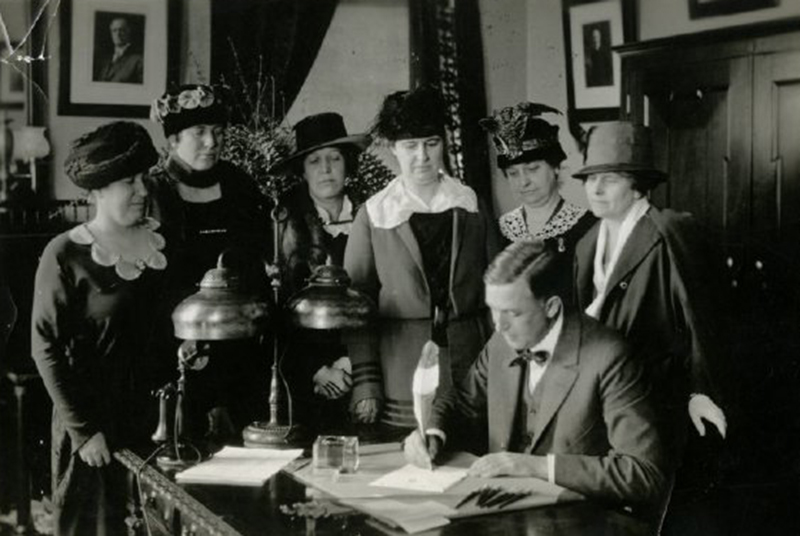On April Fools’ Day in 1919, Maine Gov. Carl Milliken signed a law banning the use of French in public schools — except during formal language instruction. It was no prank.
It was one of the most overtly racist and culturally repressive laws ever enacted in this country: a targeted effort to silence French-speaking Catholics and erase their presence from public life. Milliken’s law wasn’t created in a vacuum. It marked the culmination of decades of anti-French Catholic sentiment dating back to the 1850s, when waves of Québécois and Acadian immigrants settled in Maine’s mill towns and rural north.

Greg Jalbert is a native of Fort Kent. He currently lives in Evergreen, Colorado. A Southern Maine newspaper editor, visiting the St.
John Valley in the late 1850s, expressed the condescension and prejudice of the era: “They are generally ignorant and unambitious ...
a peculiar people, distinct in tastes, habits and aspirations from the Anglo-Saxon race.” This wasn’t idle bias — it became state policy. Editorial boards across Maine, and even the New York Times, called for “forced Americanization,” painting French Catholics as an existential threat.
There were even wild rumors of armed uprisings and a French-led annexation of Maine by Québec. These imagined fears helped ignite one of the darkest chapters in our state’s history: the rise of the Ku Klux Klan in the 1920s. By 1925, Klan membership in Maine exceeded 150,000 — one of the highest per-capita rates in the country.
Klan-backed campaigns targeted French-speaking teachers, Catholic officeholders and parish-centered communities. They demanded loyalty oaths, voter restrictions and laws that would further isolate French Catholic families. The 1919 law launched the era of silent schoolyards.
Children who spoke French — the language of their homes, churches and communities — were humiliated, punished and told they were less American. Many returned home ashamed, and slowly, the language of their ancestors faded. Not just from classrooms, but from kitchen tables and family lore.
What was lost wasn’t only language — it was identity, history and pride. Though the law was repealed decades later, the trauma lingered. We still feel its legacy today.
In 2020, Sen. Susan Collins declared, “I do not believe systemic racism is a problem in the state of Maine.” But the historical record — and the lived experience of generations of Franco-American families — tells a different story.
A story of exclusion. A story of state-sanctioned repression. I now live in Colorado but was raised in Fort Kent, where French once flowed freely in shops, restaurants, churches and ballfields.
In my father’s law office, more than 75% of client conversations were conducted in French. That world is vanishing — not by choice but by design. We owe it to our ancestors who endured this cultural trauma to speak their truth.
They did not forget their stories — they were forced into silence. Remembering that is a form of justice. The cruel irony of April Fools’ Day should not be lost on us.
Milliken’s law was no joke — it was a calculated act of cultural extermination. If Maine is serious about welcoming immigrants and celebrating diversity today, we must first acknowledge this legacy. Not with laughter, but with honesty.
Not with denial, but with reckoning. We believe it’s important to offer commenting on certain stories as a benefit to our readers. At its best, our comments sections can be a productive platform for readers to engage with our journalism, offer thoughts on coverage and issues, and drive conversation in a respectful, solutions-based way.
It’s a form of open discourse that can be useful to our community, public officials, journalists and others. Read more..
. We do not enable comments on everything — exceptions include most crime stories, and coverage involving personal tragedy or sensitive issues that invite personal attacks instead of thoughtful discussion. For those stories that we do enable discussion, our system may hold up comments pending the approval of a moderator for several reasons, including possible violation of our guidelines.
As the Maine Trust’s digital team reviews these comments, we ask for patience. Comments are managed by our staff during regular business hours Monday through Friday and limited hours on Saturday and Sunday. Comments held for moderation outside of those hours may take longer to approve.
By joining the conversation, you are agreeing to our commenting policy and terms of use . More information is found on our FAQs . You can modify your screen name here .
Show less Please sign into your Sun Journal account to participate in conversations below. If you do not have an account, you can register or subscribe . Questions? Please see our FAQs .
Your commenting screen name has been updated. Send questions/comments to the editors..
Politics

Watch for the legacy of Maine’s ‘forced Americanization’ | Opinion

A 1919 law banned the use of French in the state's public schools. We can connect the dots from there.















